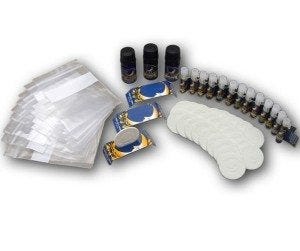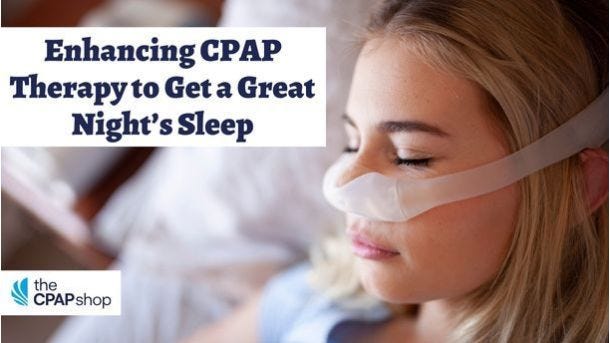Enhancing CPAP Therapy to Get a Great Night’s Sleep
Even if you are on CPAP therapy, there are other things you can do to help make your evening conducive to a better night’s sleep and your sleep more comfortable. The study of sleep has been expanding rapidly, leading to much new research and innovative products that are available to help get you the sleep you deserve. Even if your CPAP machine is your first defense, many of these products and tricks will supplement its use.
Think of your bedroom as a stay-well room. It is a room to recover and relax from a long, stressful day at work or after trying to keep up with kids. Remind yourself that sleeping helps the body to heal and reinvigorate itself so you can do it all again the next day. Because sleep is so important to the quality of life issues, these pioneering products and ideas could help anyone enhance their sleep.
- Melatonin - it is the key to sleep. It stabilizes your sleep and wakefulness patterns by regulating the chemicals in your body that make you feel either drowsy or alert. Melatonin is not like a sleeping pill but it is necessary for quality sleep. Here are a few foods that help to increase your Melatonin levels: raspberries, almonds, sunflower seeds, tart cherries, flaxseeds, and strawberries.
- Aromatherapy – New to the area of CPAP therapy, aromatherapy has been around for centuries. Now you can add aromatherapy to CPAP adding a soothing, calm atmosphere during therapy. https://www.thecpapshop.com/aromatherapy-basic-starter-pack

- Lighting - Much research has been put into studying lighting and its effect on the body. Sunlight has been correlated to reducing blood pressure, reducing heart attack and stroke risk and even prolonging life. Even before you wake, light begins waking your brain. Room lighting should be regulated so that it does not disrupt melatonin secretion. Some new types of lighting include: Advanced Room Lighting which improves the sleep/wake cycles by assisting in regulation of melatonin production; Wake-Up Light Therapy which is great for travelers as it emits short periods of blue-shaded lighting to increase energy and reverse effects of jetlag; Night lighting: makes use of small LED lamps to illuminate pathways at night so it does not disturb melatonin levels. For a more decorative and striking light, try a red nightlight. Red light is least likely to suppress sleep-initiating melatonin, an International Journal of Endocrinology study found.
- Instead of waking to a horn or your favorite radio morning show, try a Dawn Simulator Alarm Clock. These clocks gradually awaken the body instead of startling it first thing in the morning. If money is no object, install a shower infused with Vitamin C. Yes they exist! Shower water infused with vitamin C helps to neutralize chlorine and promote healthy hair and skin…and a refreshing morning shower.
- Purification Systems - Air Purification System can be necessary for people who are sensitive to allergens, pathogens and toxins in the air. Most advanced HEPA-standard air purification system improves air quality which leads to better breathing and less congestions. Water Filtration Systems reduce minerals, byproducts, chlorine, and pesticides. Although a water filtration system is not directly related to sleep, it will aid in overall health. If neither is within reach, try duct cleaning to improve air quality and a water dispenser to remove harmful chemicals.
- Bedroom Ideas – Research for Japan states that 50% humidity equals the optimal melatonin release. Gauge the humidity levels in your bedroom at bedtime and in the morning with a hygrometer. It will help you understand how ambient humidity changes during the night. If it is too dry, use a humidifier with an automatic off-and-on switch in order to hit the optimal humidity levels. However, if it is always too damp, you will need a dehumidifier with auto shut-off. For CPAP users, heated humidification will provide instant optimal humidification levels and help reduce dryness and congestion.
William Kohler, M.D., of the Florida Sleep Institute posits that the ideal temperature for sleeping is about 72°F. If the ambient temperature in your room changes dramatically, it could unsuspectingly affect sleep. Moreover, rainouts can occur during CPAP machine use. If your CPAP machine does not have a heated humidification system and heated tube, try one of the tube covers. Although not as effective, it will work during small changes to room temperature.
Mattress type is a personal preference. However, if you are in the market for a new one, according to Michael Decker, Ph.D., a Georgia State University sleep researcher, test them by lying in your normal sleep position for 15 minutes, ideally with your bedmate. Also, pick a mattress firm enough to support you but without any pressure points. To further reduce irritants, use mattress and pillow covers to block sleep-disrupting dust mites and pet dander.
Technology is not only invading our workplace, it is also beginning to creep into the bedroom. With smartphones and tablets becoming the norm, a study in Applied Ergonomics found that two hours of tablet time can significantly reduce melatonin levels compromising sleep. Try turning it off at least an hour prior to bedtime.
Although a glass of red wine has been proven to be beneficial to health, avoid alcohol right before bed. Alcohol is a muscle relaxer that relaxes your throat muscles which contributes to snoring. This could impact CPAP pressure needs and reduce the overall quality of sleep you receive.
Although some of these products and ideas might be overkill, it goes to the fact that it is important to reap the benefits of quality sleep. If CPAP therapy is challenging, address smaller issues such as lighting or mattress type before giving up. CPAP therapy is only part of an overall plan to promote quality sleep and a healthy lifestyle.
The CPAP Shop is committed to enhancing the lives of people with sleep apnea through information and high-quality therapeutic products. If you have questions about CPAP Therapy please call (866) 414-9700. Or, you can contact us through our website at www.thecpapshop.com
This post was originally posted on May 23, 2013 and updated on October 16, 2023.




